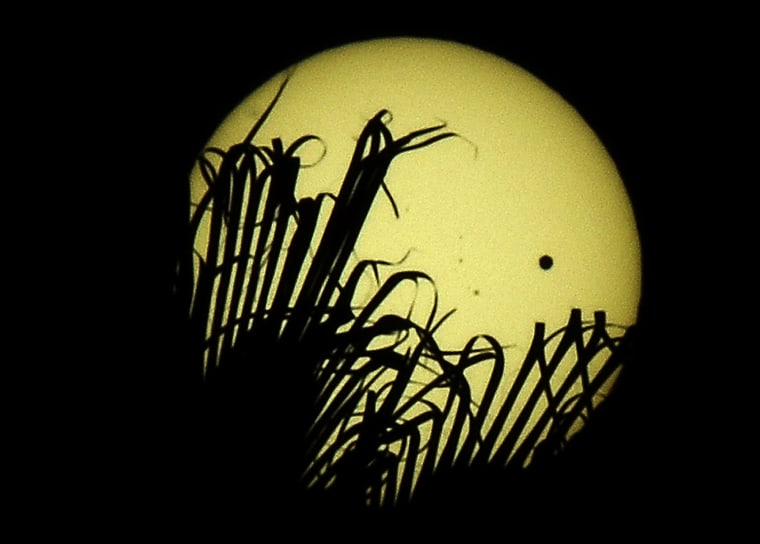It could be atmospheric chemistry. Or pollution from unseen volcanoes. But there's a chance — a not insignificant chance — that scientists have made the first clear discovery of life beyond Earth.
Researchers at Cardiff University in Wales and the Massachusetts Institute of Technology, together with colleagues from Asian and other British universities, have just published a paper in the journal Nature Astronomy in which they claim to have found a smelly, toxic gas — phosphine — high in the thick clouds of the Venusian atmosphere. On Earth, phosphine is produced by certain types of bacteria.
This discovery was unexpected and a potential game changer. The presence of airborne phosphine is a little like scat stumbled upon in the desert.
This discovery was unexpected and a potential game changer. The presence of airborne phosphine is a little like scat stumbled upon in the desert: a signal that life is in the neighborhood.
But if, indeed, living organisms are floating in the dense air of Venus, it would enormously strengthen the argument that life isn't a cosmic miracle.
For decades, scientists have pursued life in space in three ways. One is to simply search for it, the underlying motivation for sending many of the rovers that crawl across Mars. A second is to try to tune in to alien radio transmissions. And a third scheme — less well known — is to use telescopes to examine the atmospheres of planets and moons for biomarkers: gases produced by life.
A prime example of a biomarker is the oxygen in our own air, the exhaust gas of the photosynthetic life that thrives here. The methane that seems to occasionally waft through the thin air of Mars is another. Methane, as anyone unfortunate enough to live near a garbage dump knows, is a breakdown product of some bacteria.
Lamentably, bacteria aren't the only manufacturers of methane. It can also be produced by geological processes. Methane might mean life on Mars — but it might not.
What makes the discovery of phosphine in Venus' air so compelling is that the researchers have racked their brains trying to come up with ways to explain its presence short of invoking biology. As the authors discuss in their paper, they've weighed the likelihood of weird chemical processes in the atmosphere that could produce it or the possibility that it was spewed out of volcanoes below. Even the reactions caused by meteors that streak through the clouds or the chemical effects of lightning were considered. But the scientists couldn't find a plausible non-biological explanation.
Nonetheless, they remain cautious. History is littered with claims of extraterrestrial biology that later proved suspect or just plain wrong, from the canals on Mars to the squiggly microscopic features seen in a Martian meteorite. Everyone who's claimed to have established the existence of life elsewhere has been seriously challenged. The strong consensus of science is that our world is the only place in the universe where life is known to exist. To prove otherwise is a tantalizing goal, but the proof needs to be indisputable.
So wariness reigns. A member of the research team, Sara Seager, an MIT professor of physics and planetary science, put it this way while talking to me recently: "There could be two explanations. One that there is some unknown chemical process that could somehow produce the phosphine. The second is that ... there's life."
Venus has long been called Earth's twin, primarily because the two planets are the same size. But it's not the favored twin.
But Venusian life? Yes, Venus has long been called Earth's twin, primarily because the two planets are the same size. But it's not the favored twin: Spacecraft have revealed a baked landscape, with temperatures pushing 900 degrees Fahrenheit. For decades scientists assumed Venus was a sterile hell and largely ignored it in favor of Mars or several of the water-rich moons of Jupiter and Saturn.
But not all scientists. Planetary astronomer David Grinspoon, of the Planetary Science Institute, has persistently championed the idea of paying greater attention to Venus. He's pointed out that at 30 miles above the surface, the cloud temperatures drop to roughly the same as on a fall day in New York. The idea that some microbes could be floating in these extraordinarily dense and temperate clouds isn't outrageous. Such organisms could be the leftovers from simple life that may have been spawned during the billions of years that Venus had oceans, vast seas that eventually boiled away. They would be the microscopic refugees from a world that slowly went bad.
In a conversation with me, Grinspoon reacted to the phosphine discovery by saying it "will force people to take seriously the plausibility of a cloud biosphere on Venus."
Want more articles like this? Follow THINK on Instagram to get updates on the week's most important scientific analysis
If past is prologue, the excitement following the discovery of this malodorous gas will give way to an explanation that doesn't depend on the presence of life. After all, nature is exceedingly adept at cooking up conditions and compounds that humans haven't foreseen. If that happens, what is now an exciting discovery will become one that's merely interesting.
But we can't yet rule out the more dramatic outcome — the possibility that, at long last, we've proven that we have company in the cosmos. Yes, they're microscopic and live an incomprehensibly dull existence. But unlike everything else we've yet found in the heavens, they're alive.
Related:


